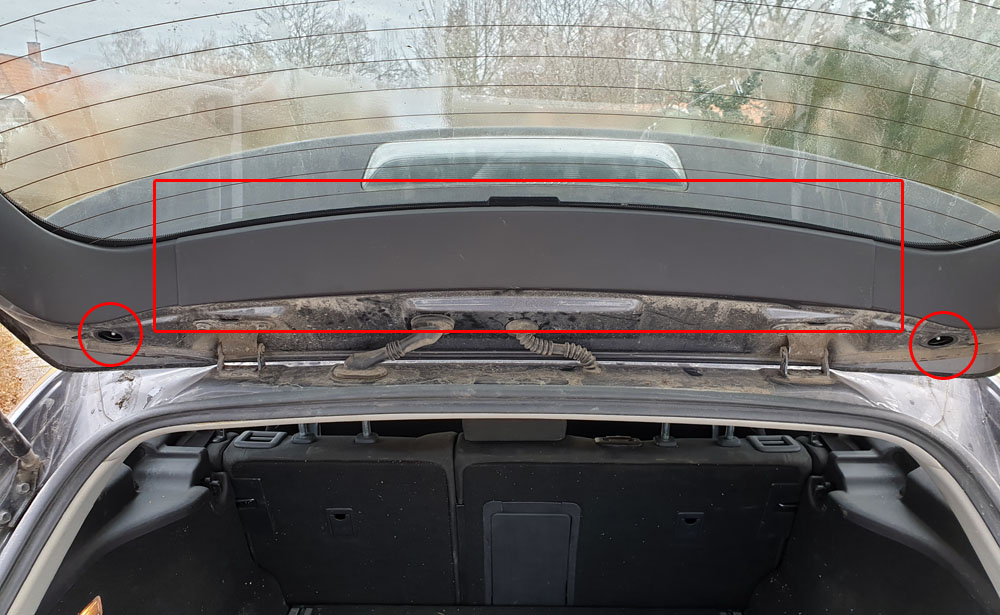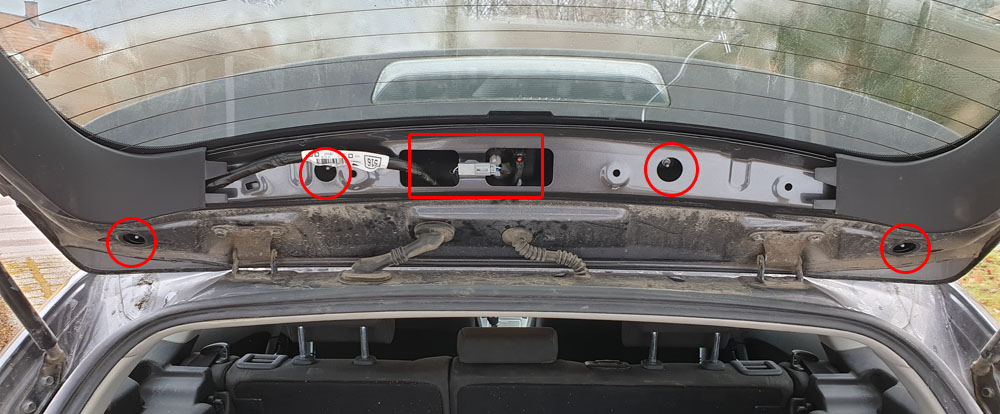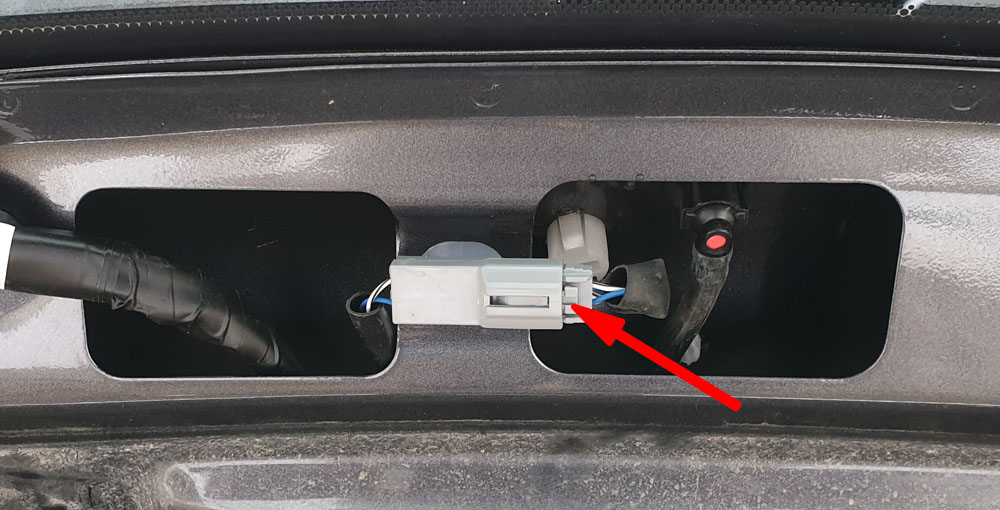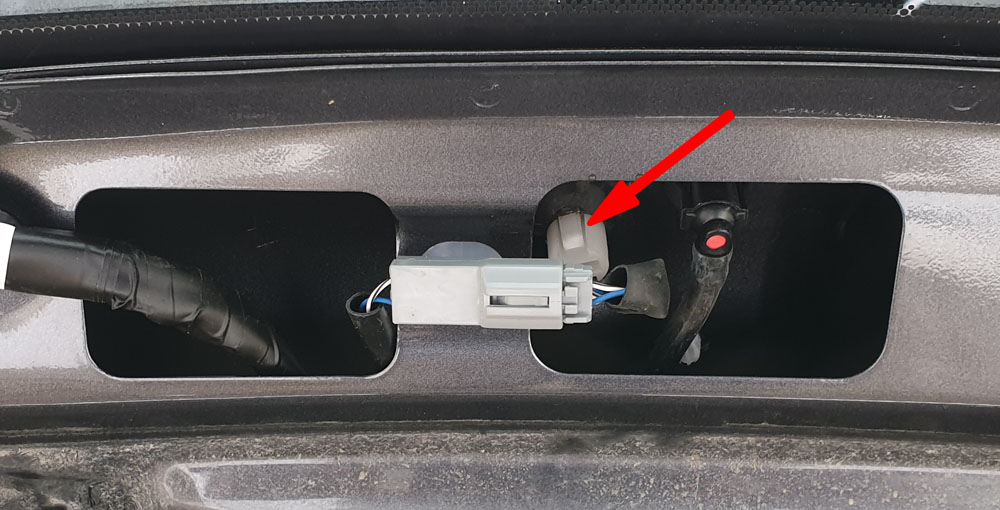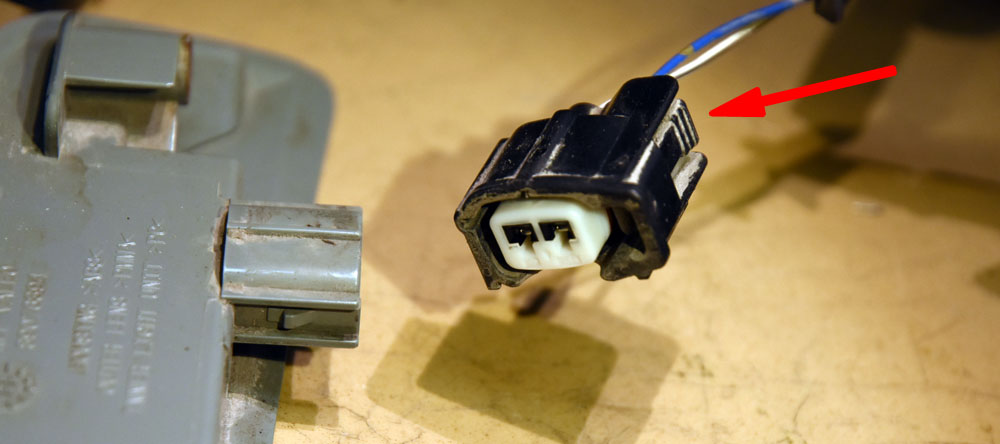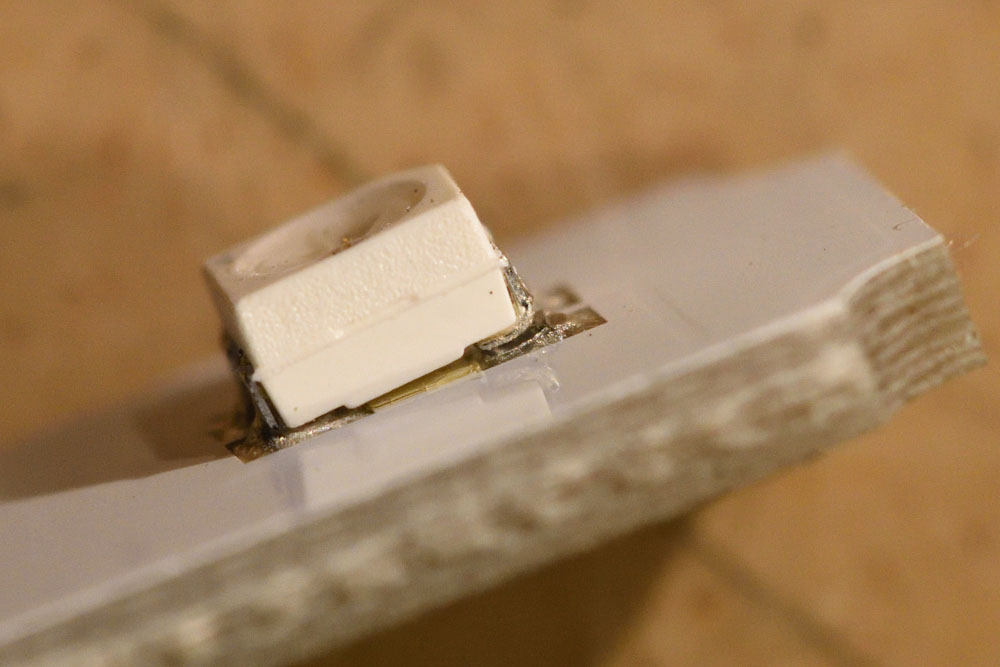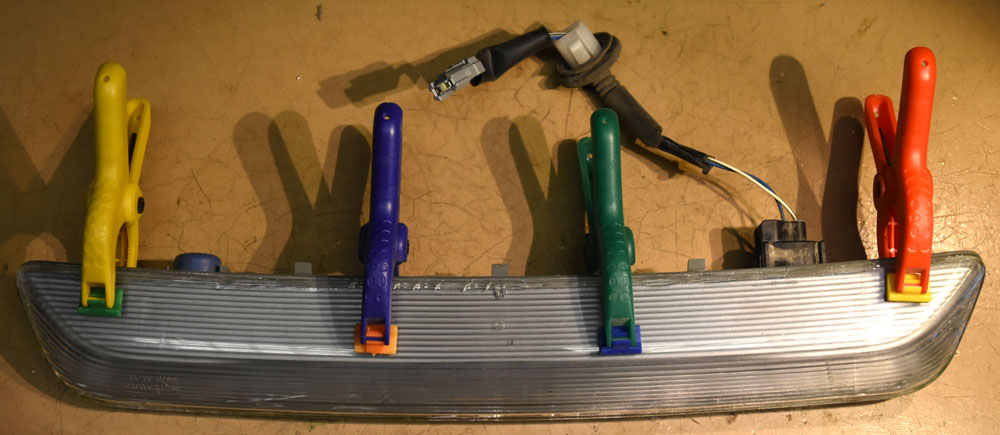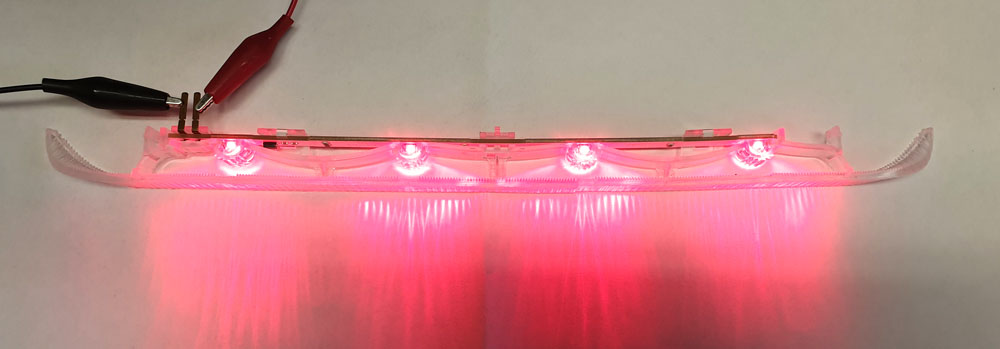Början av semestern ägnades åt att montera ett Willab Garden Green Room Season Classic i trädgården. Vi hade låtit en firma anlägga en isolerad och dränerad grund, men själva bygget hade vi tänkt göra själva. Hur svårt kan det vara, liksom?
Det visade sig att vissa moment var mer utmanande än jag hade trott. Att sätta upp stommen var inga problem, men framförallt att få de tunga takfönstren på plats fick lösas med en del oväntade ingenjörsinsatser. Här följer ett antal bilder och text som beskriver monteringen.
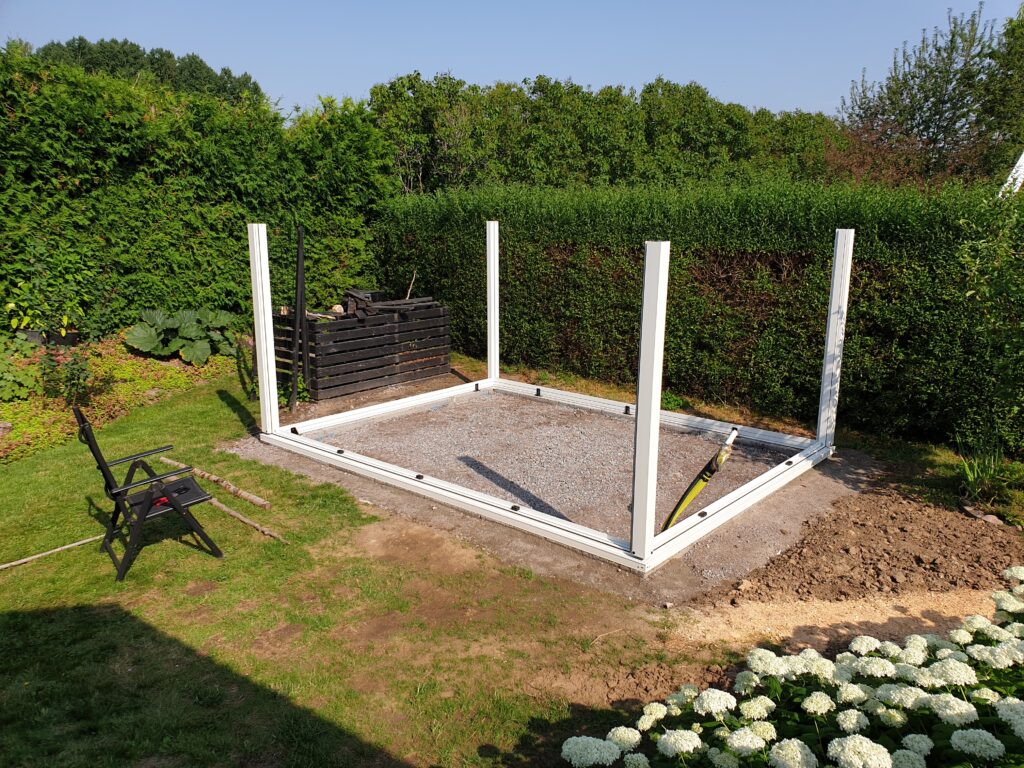
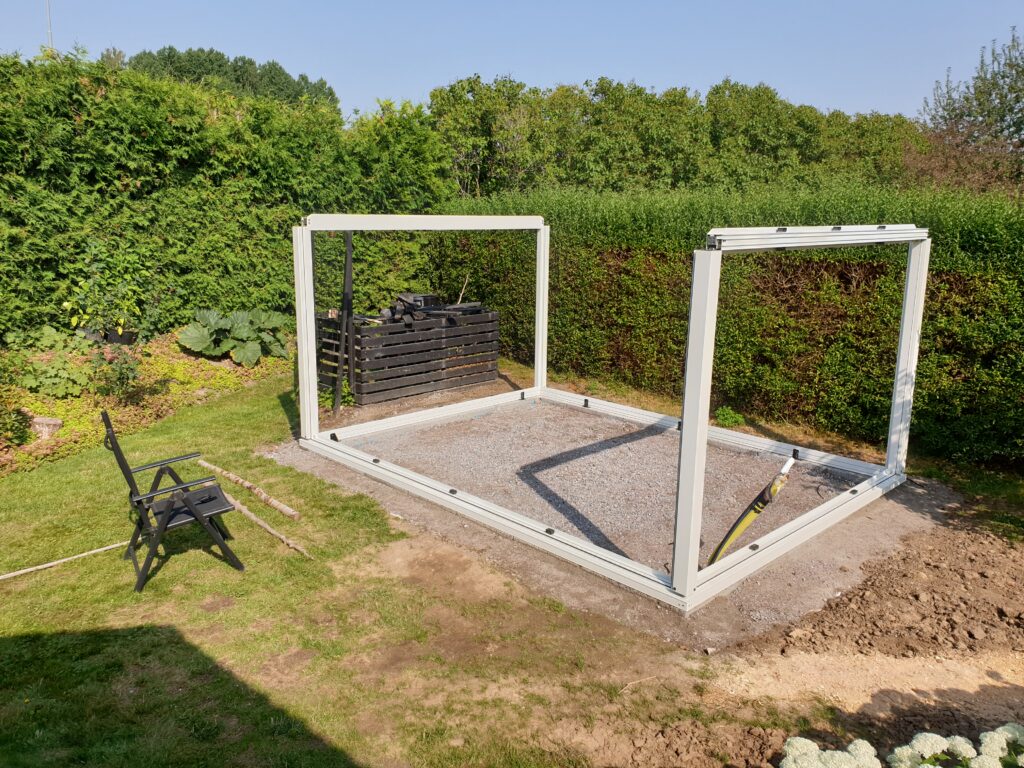
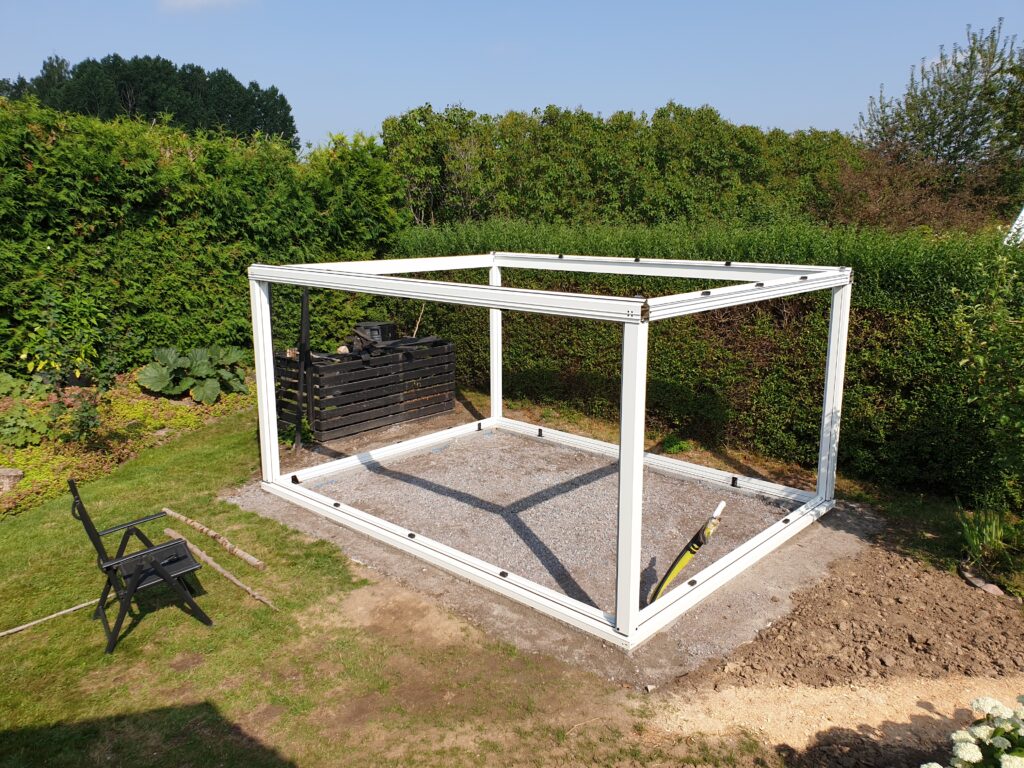
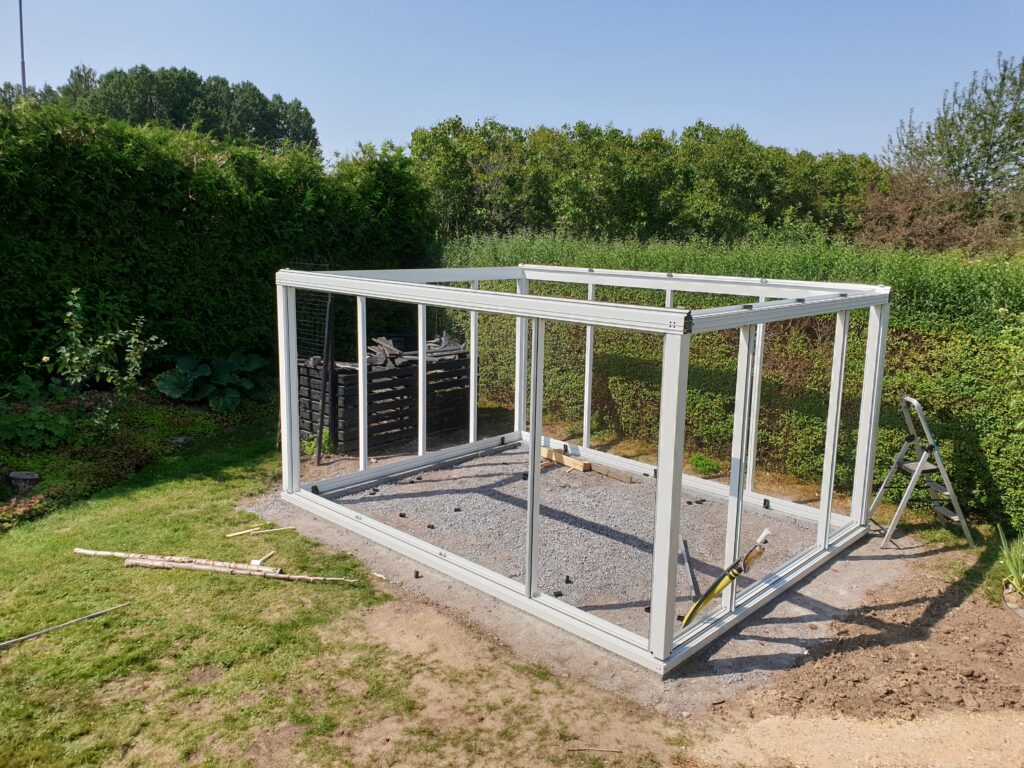
Här någonstans insåg vi att det blivit fel i leveransen. Vi hade beställt kittet för att få dörren på långsidan istället för på gaveln (som är standard), men det kit vi fått var något som passade ett helt annat växthus. Efter telefonkontakt med Willab Garden och reklamation på deras hemsida lovade de att skyndsamt skicka de saknade delarna (inte minst några stolpar som ska vara mellan rutorna). Som tur var hade vi fått alla glasskivor som behövdes, så det var enbart saker de normalt har i lager som saknades. Reklamationen gjordes på torsdag eftermiddag och följande tisdag kom leveransen. Skönt att de var smidiga och snabba att hantera ärendet.
Bygget kunde fortskrida i väntan på delarna, men en del av momenten fick utföras i en annan ordning än den som byggbeskrivningen anbefallde.
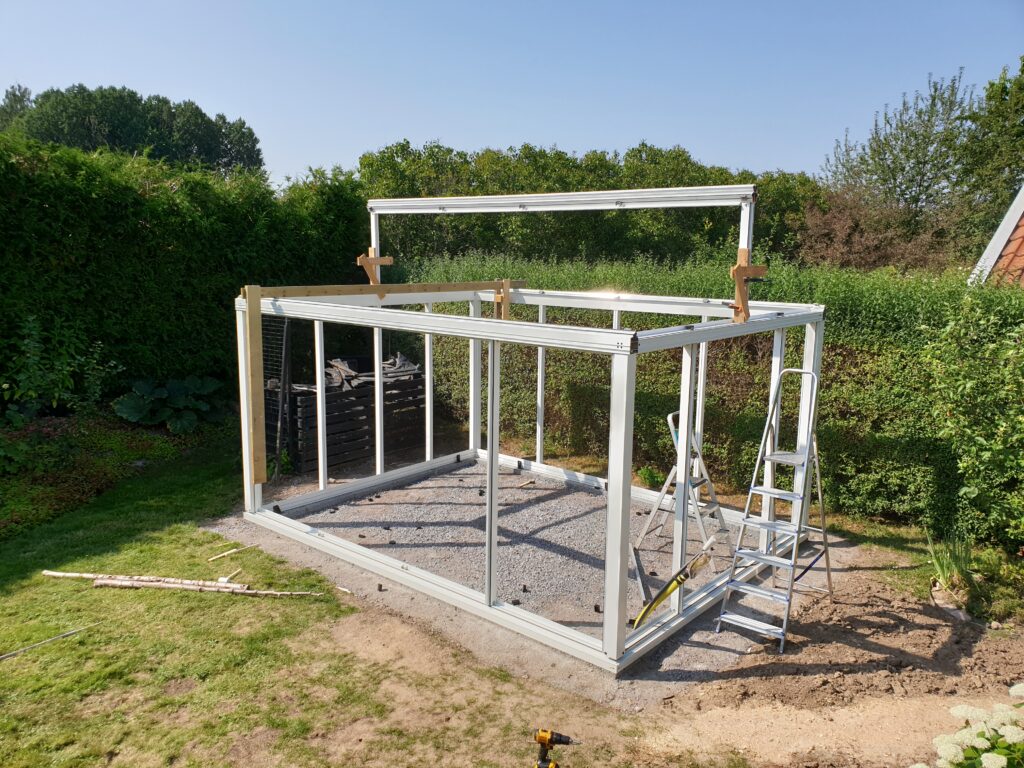
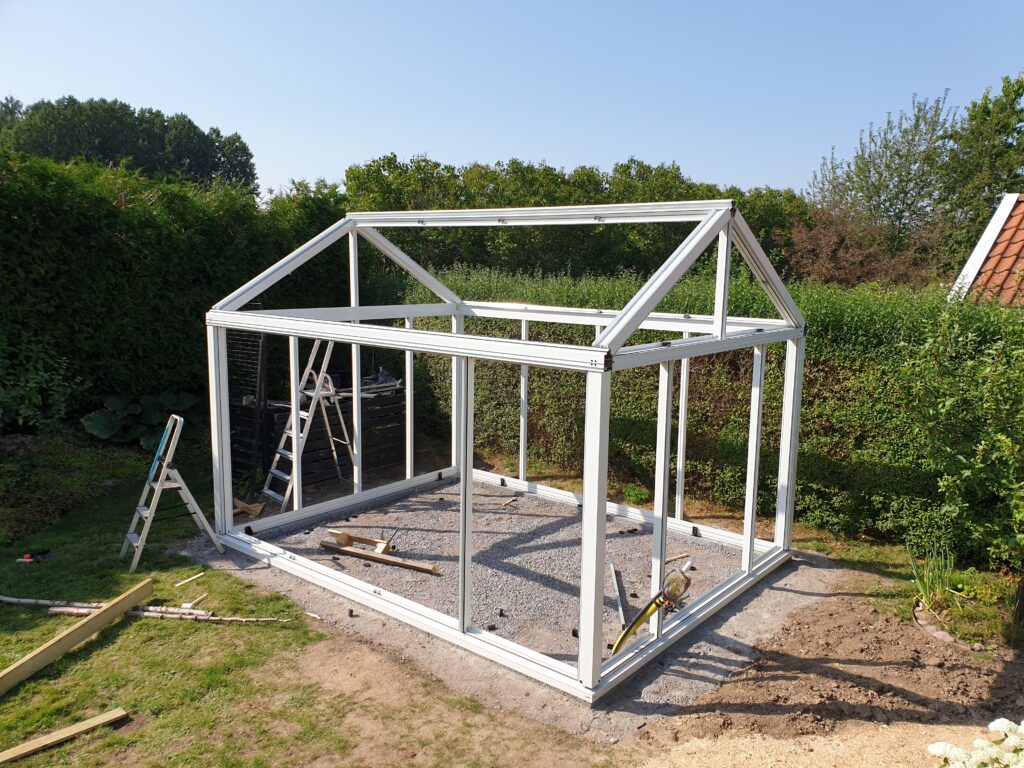
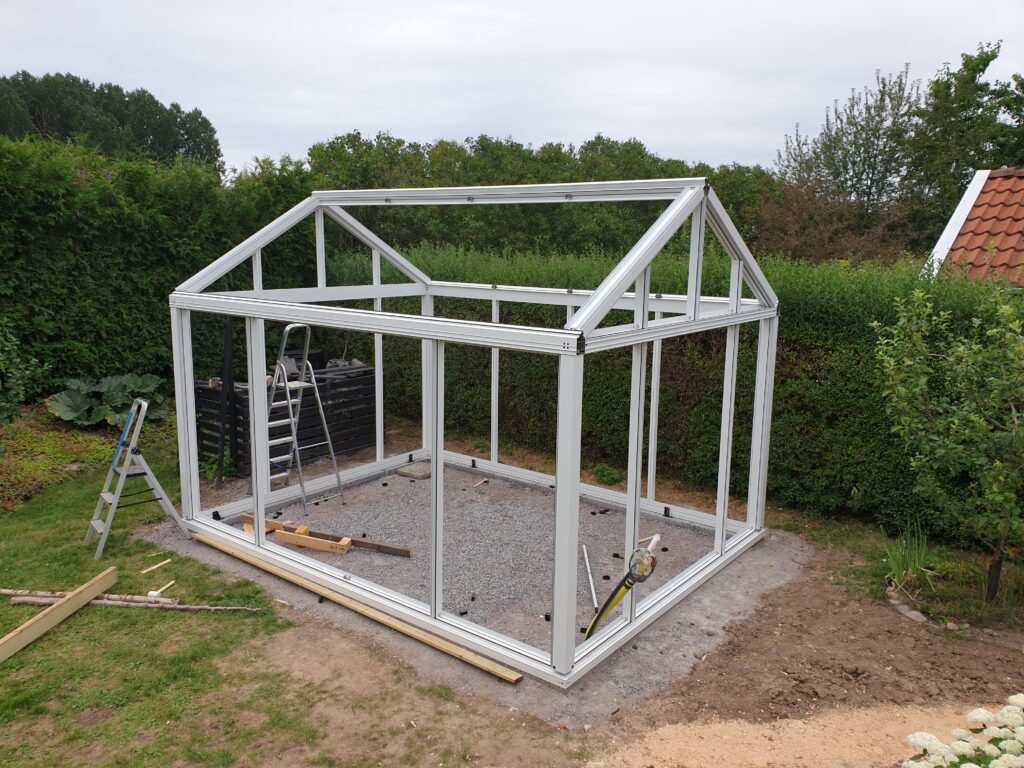
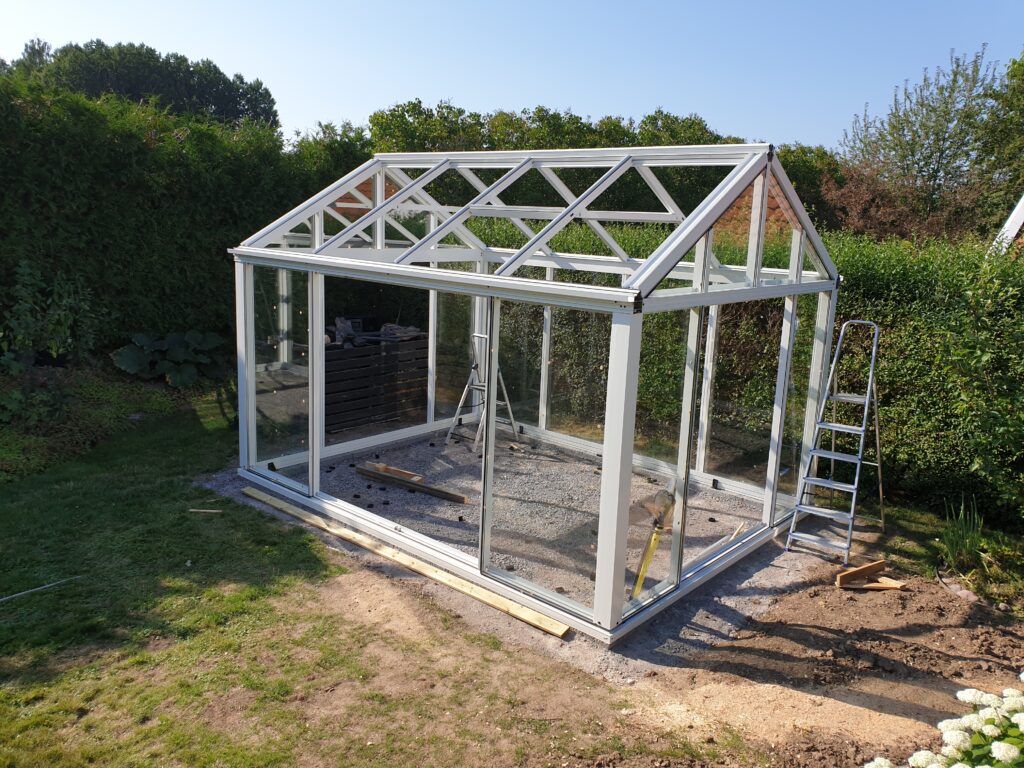
Nu började de mer utmanande momenten. Att lyfta upp de två mindre, fasta, takfönstren gick att göra genom att stå på en enkel invändig ställning, även om det var på gränsen till lite väl tungt för mig. De större takfönstren väger uppskattningsvis 40 kg och är nästan 2 m2 stora, så att lyfta upp dem på samma sätt lät sig inte göras.
Efter en hel del funderande skruvade jag ihop en sorts ramp som vilade på hängrännan (med support underifrån). Rampen var först nedfälld så att det någorlunda enkelt gick att lyfta upp en ruta på den, men därefter lyfte jag upp nedre änden av rampen och stödde upp den med en hög bock för att få rutan i lämplig vinkel för att dra den på plats.
För att dra rutan över rampen byggde jag en vinsch som placerades under nocken och drog ett rep över nocken till nedre hörnen av rutan. Det hade nog varit smartare att istället fästa repet i den utmärkta glaslyftaren som följde med växthuset, men att fästa i hörnen (med hjälp av hemsnickrade hakar av trä) gick det också.
Rampen hade dels glidytor täckta med handdukar för att inte repa rutan, och dels hjul som rutan kunde rulla på. När den var nästan på plats tog jag över och lyfte den från en ställning inuti växthuset. En ytterligare person vevade på vinschen medan en annan hakade av repet från hörnen när det var dags för det och guidade sedan övre delen av rutan.
Den här metoden är inget jag rekommenderar, även om den fungerade. Den metod vi senare använde på andra sidan av växthuset är smidigare.
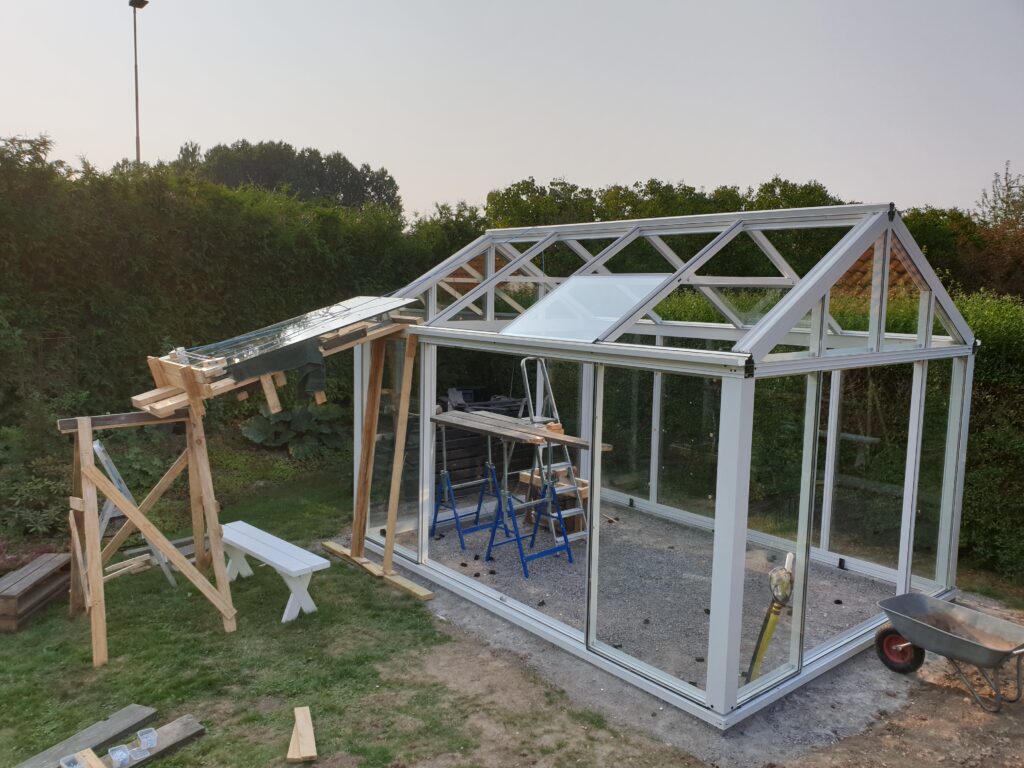
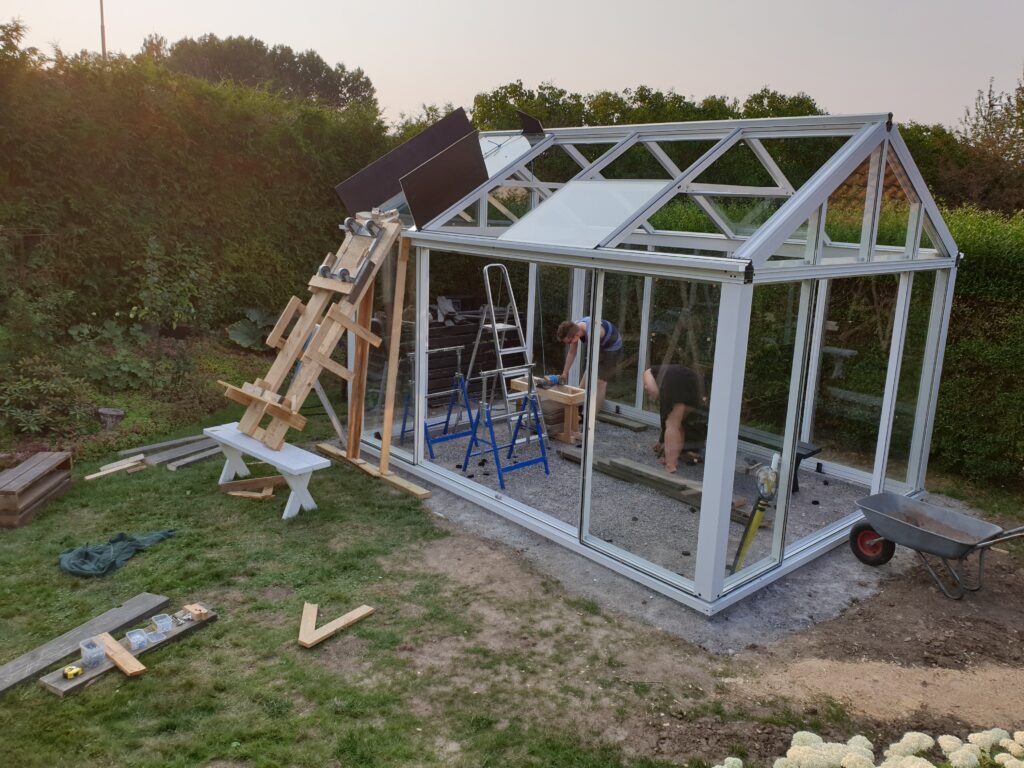
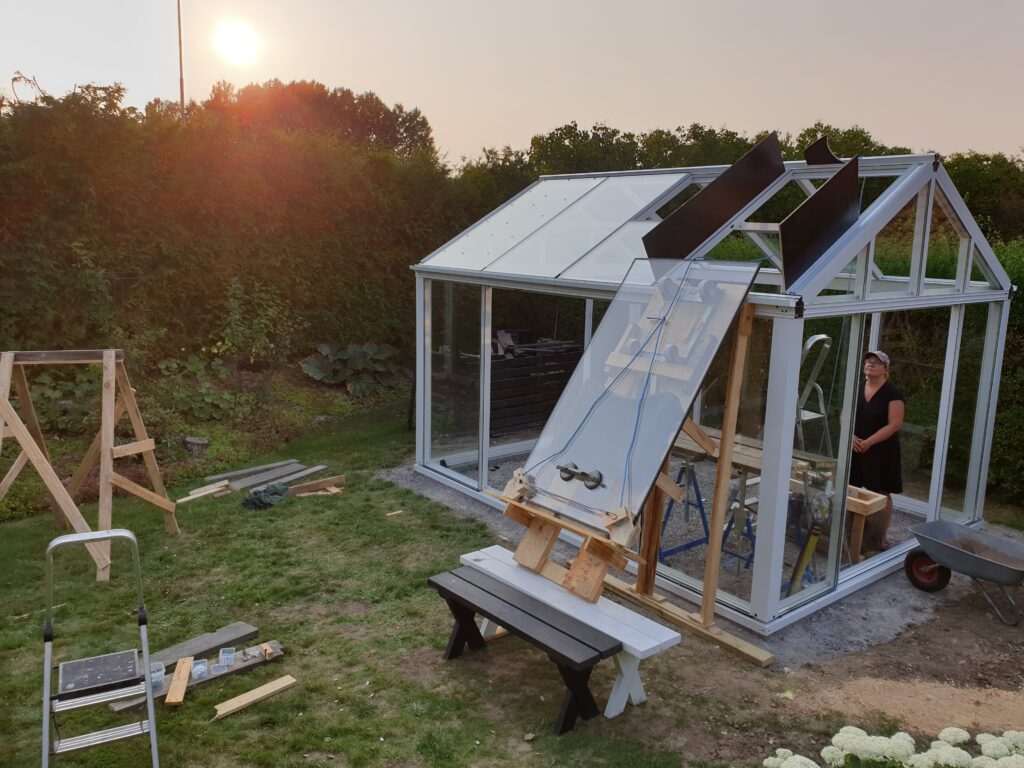
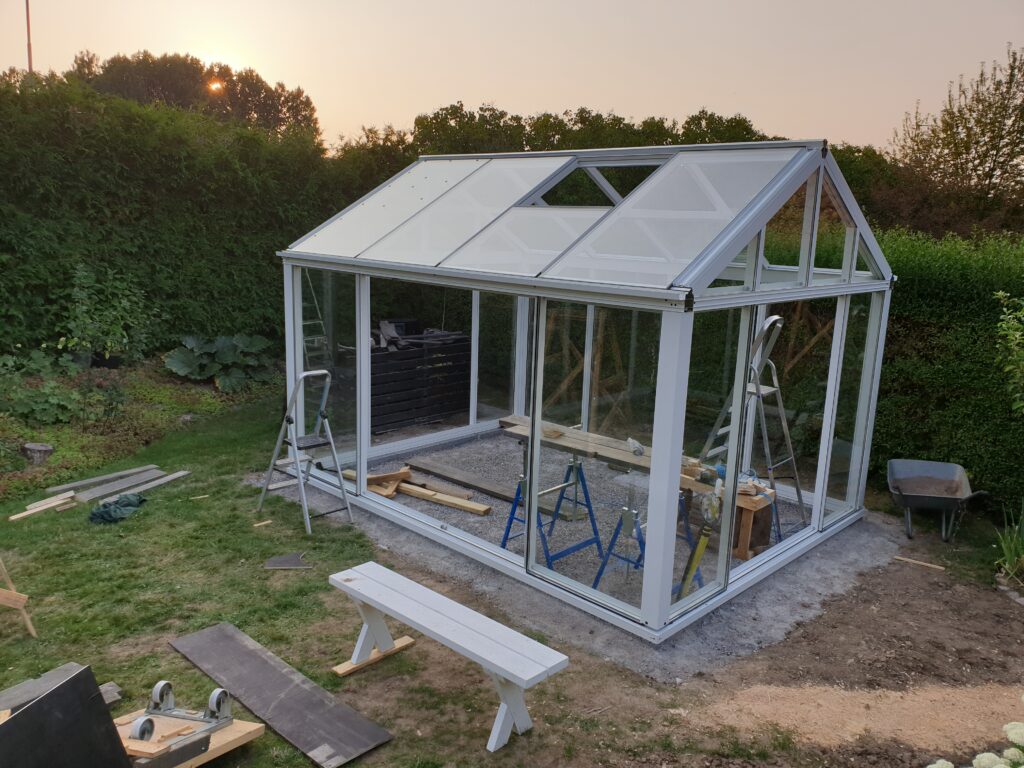
Eftersom det står en häck mot granntomten en halvmeter från andra sidan av växthuset så gick det inte att använda rampmetoden även där. En annan lösning behövdes, men det var inte uppenbart hur det skulle gå till. En natts funderande var på sin plats.
Den lösning jag till slut kom på var att lyfta upp rutorna genom taket på växthuset med hjälp av vinschen, placera dem rätt medan de dinglade i luften och sedan försiktigt sänka ned dem efter att nederkanten placerats rätt. För att möjliggöra detta behövdes en kran mellan taknocken och hängrännan på en höjd av drygt en meter över taknocken.
Jag snickrade ihop en sådan kran, delvis av virke från lårarna som växthuset levererades i, men när vi “bara” skulle lyfta upp den på taket visade det sig att den var lite för tung och taket lite för högt för att det skulle gå att göra på ett enkelt och säkert sätt.
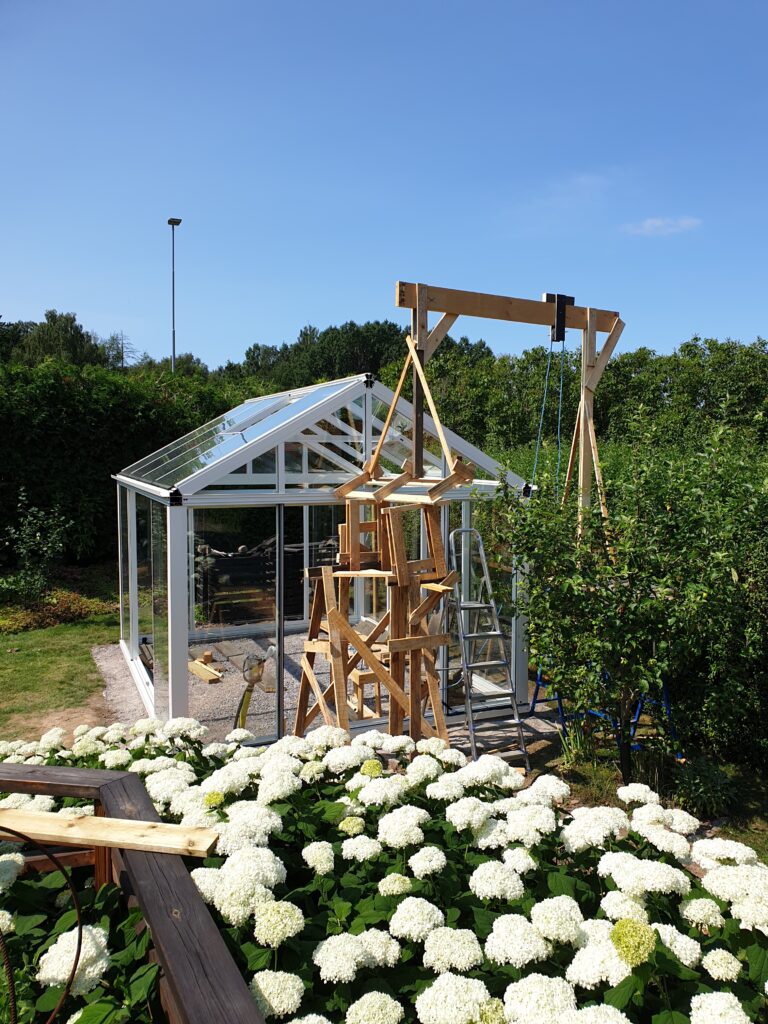
Lösningen var att bygga en ännu högre kran som kunde lyfta upp den första kranen! Så en ca 6 m hög stolpe av brädor skruvades ihop med ett block högst upp. För att slippa åka och köpa delar svarvade jag hjulet i blocket själv och som axel använde jag ett rör av aluminium med en M8-bult igenom.
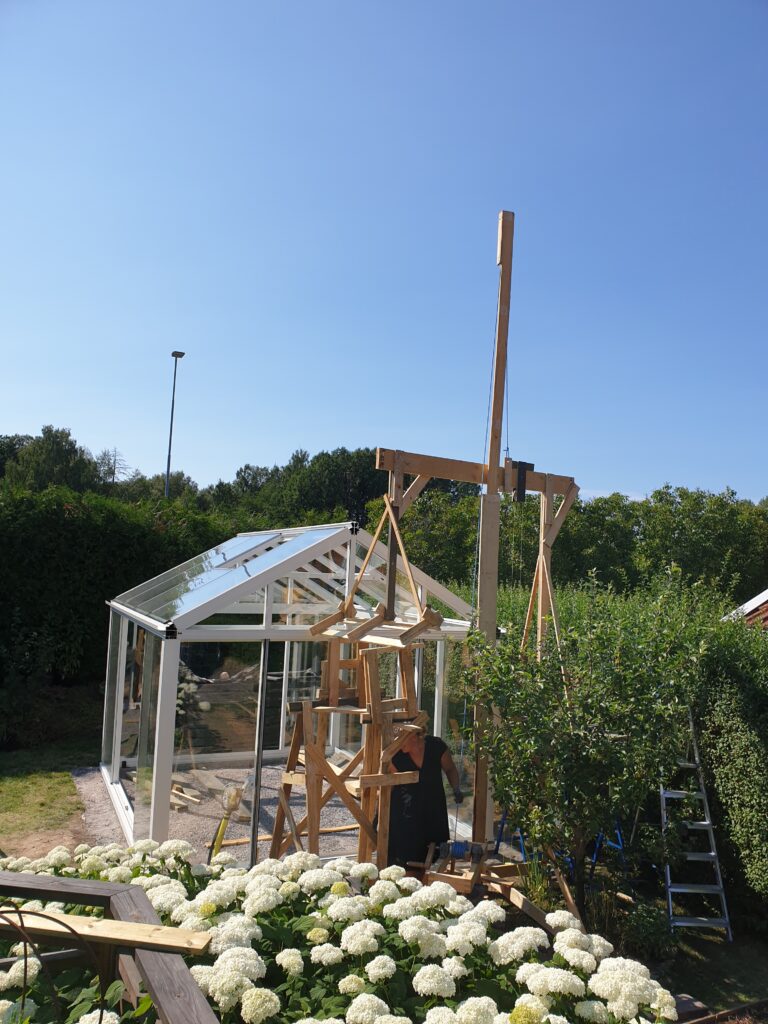
Den höga kranen behövde såklart en del strävor för att stå stadigt. Den fungerade utmärkt, men för säkerhets skull kallade vi in förstärkning, så med en person som vevade vinschen och två som guidade den dinglande kranen så gick det fint att få den på plats på taket.
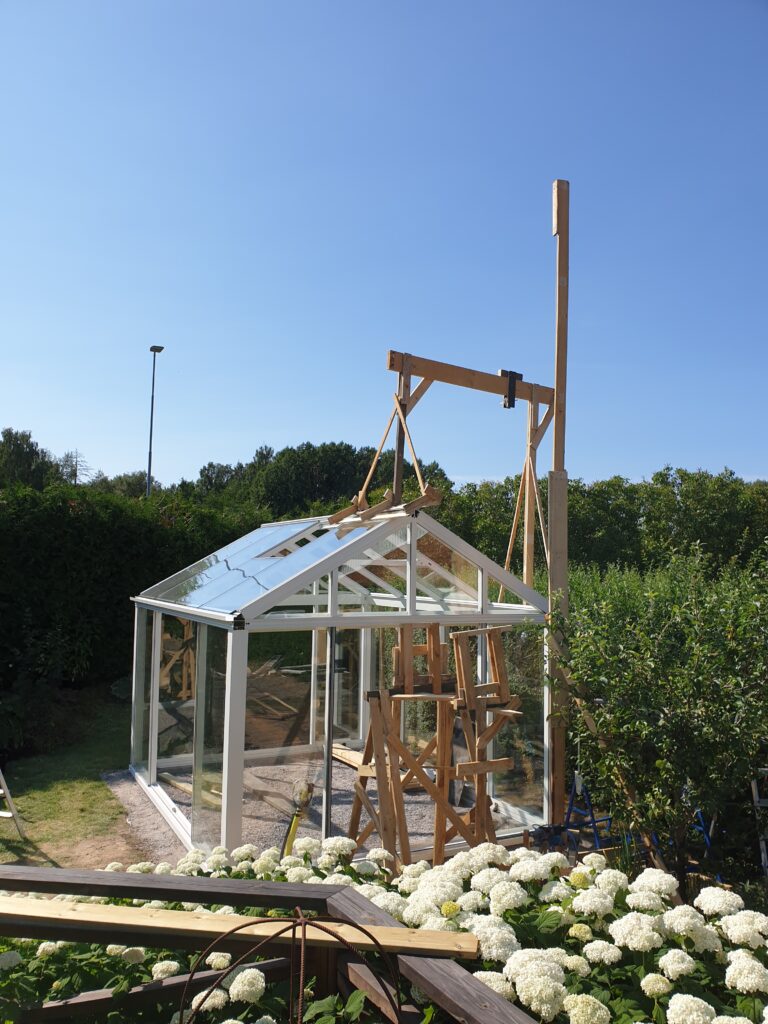
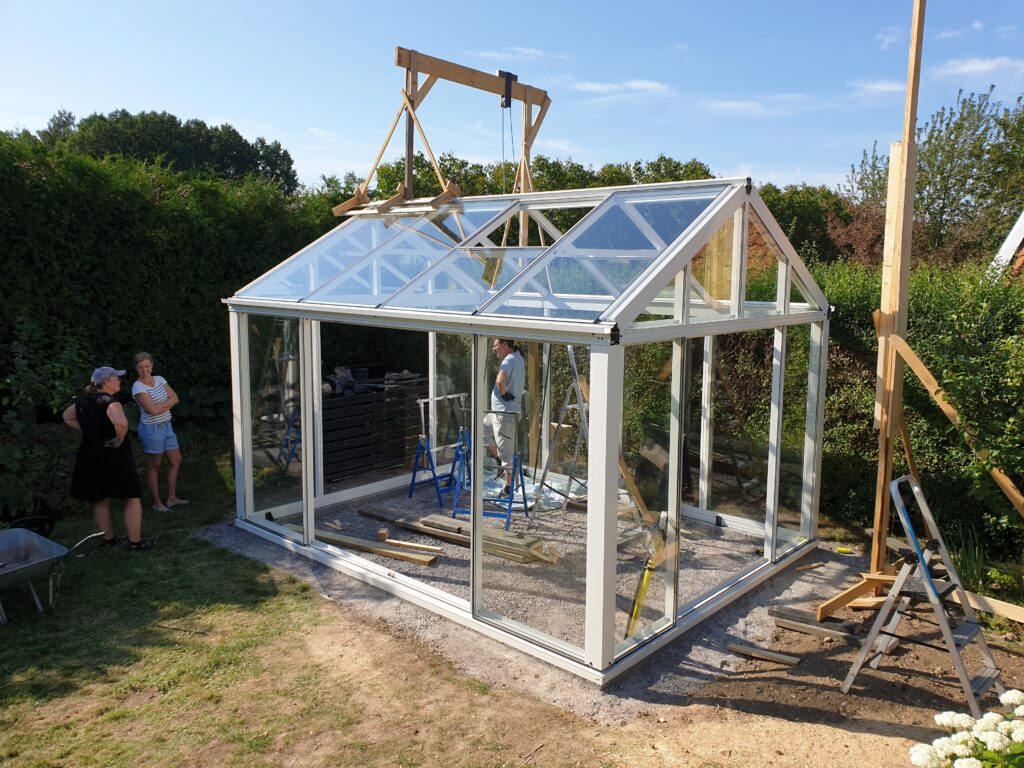
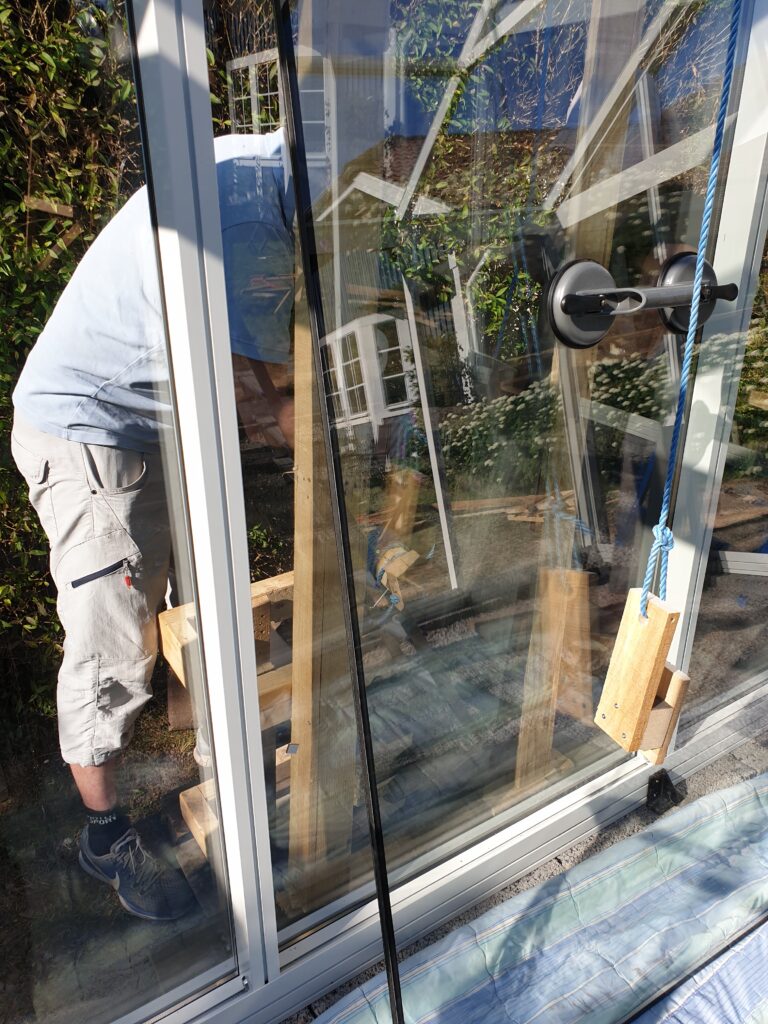
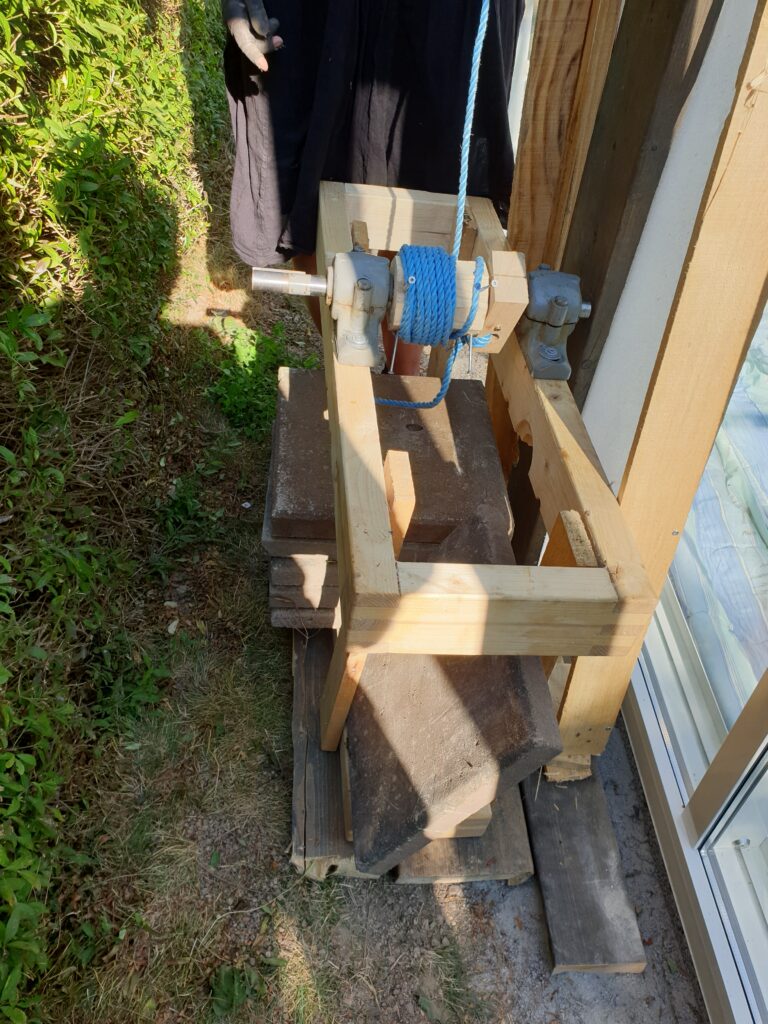
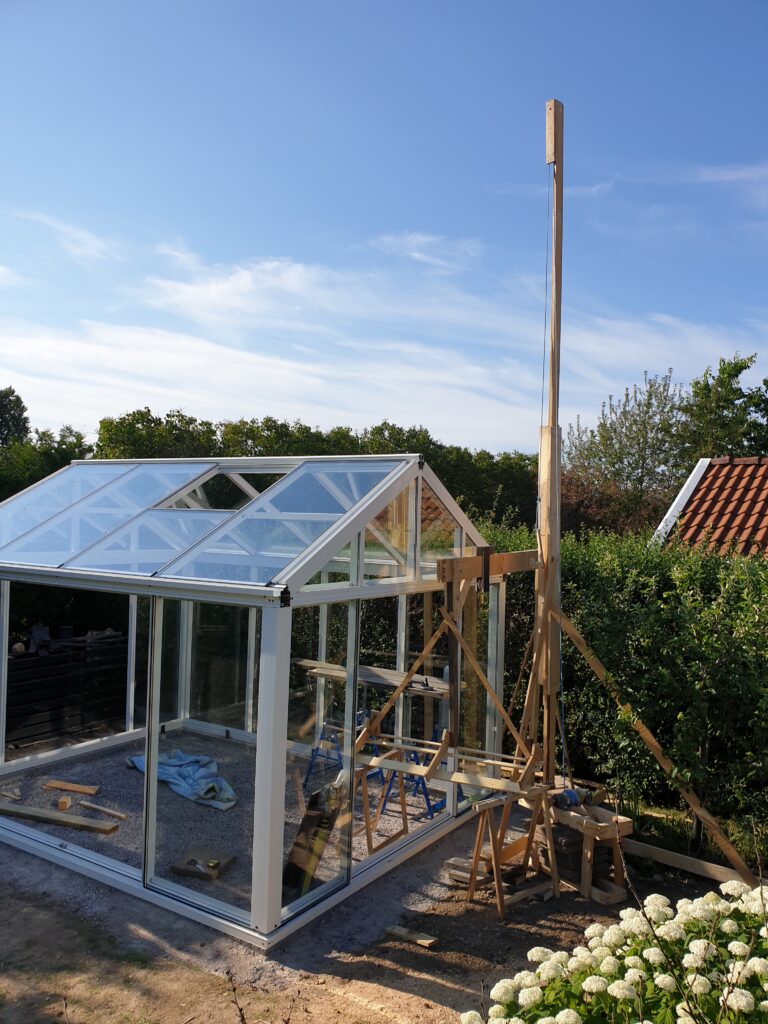
Nästa utmaning var att komma åt att skruva i några skruvar uppe på nocken för att hålla fast lister som håller fast takfönstren. Lösningen blev att bygga en tillräckligt hög ställning inuti växthuset så att det gick att nå skruvarna i mitten av taket via de ännu öppna takluckorna.
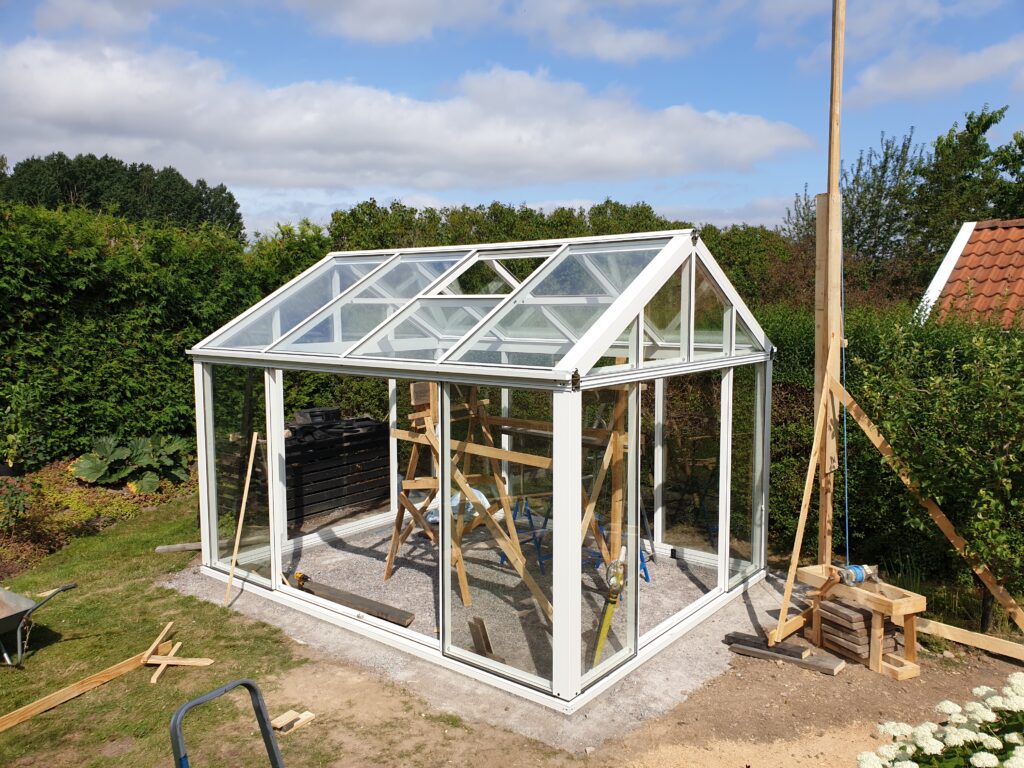
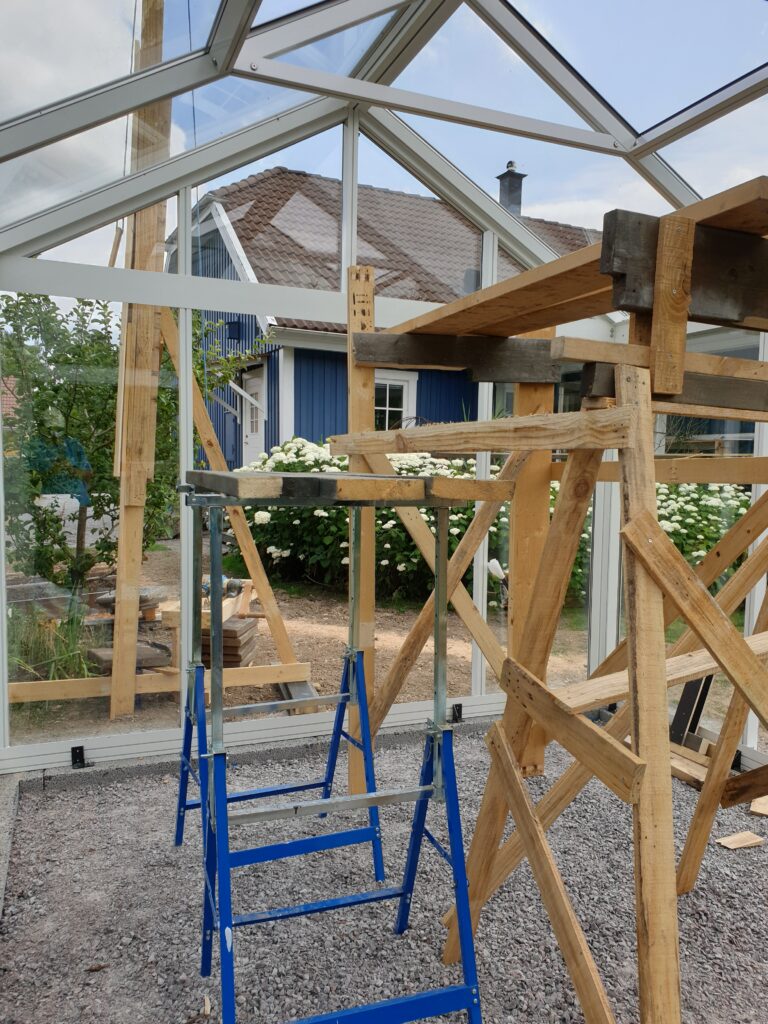
En återstående utmaning var att få de öppningsbara takluckorna på plats. De ska lyftas upp till nocken och skjutas in i ett spår från gaveln. För detta jobb använde vi den höga kranen igen, men aningen flyttad och lutad mot växthuset. Vi klarade jobbet på två personer.
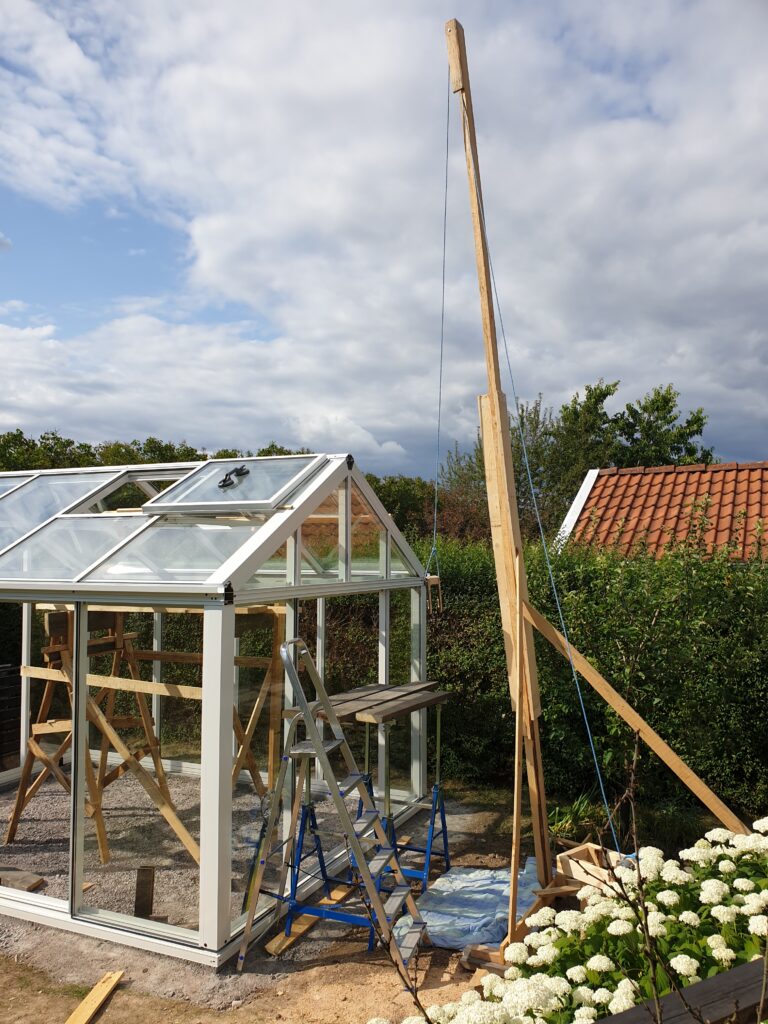
Gummilisterna runt takluckorna var förresten lite trixiga att få på plats när jag skruvade ihop luckorna. Efter mycket trilskande kom jag på att testa att spruta på diskmedel utspätt i vatten på gummilister och fönster. Efter detta gick det väldigt mycket lättare. Detta tips hade gärna fått stå i monteringsanvisningen.
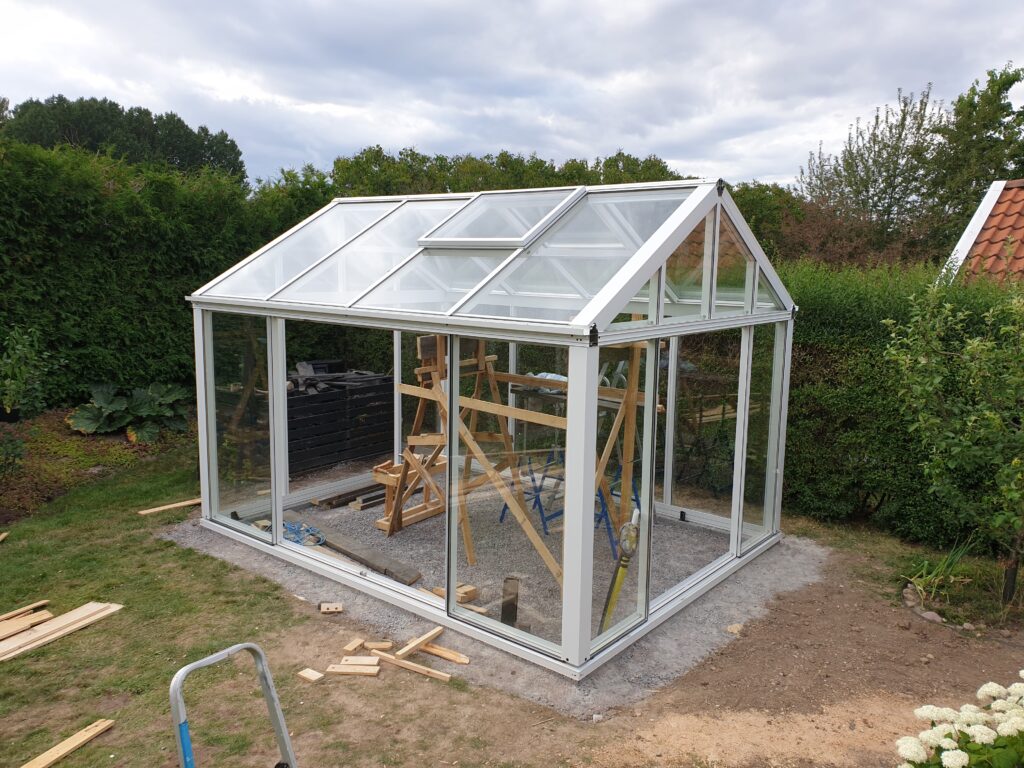
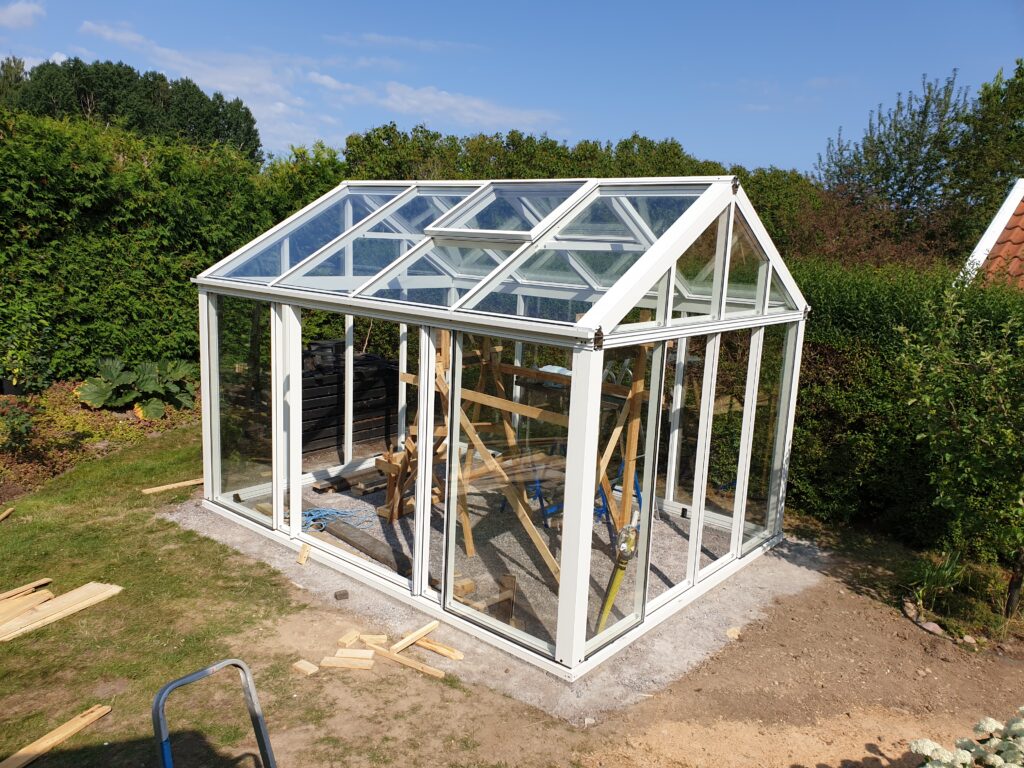
Dörrarna var ännu lurigare än takluckorna att skruva ihop. Man måste väldigt noga kontrollera detaljer i bilderna i anvisningen och även lista ut några saker som inte står i anvisningarna för att lyckas. Jag tror jag monterade den ena dörren tre gånger innan det blev helt rätt.
Dörrarnas gummilister kom på plats med samma diskmedelstrick som jag använde på takluckorna.
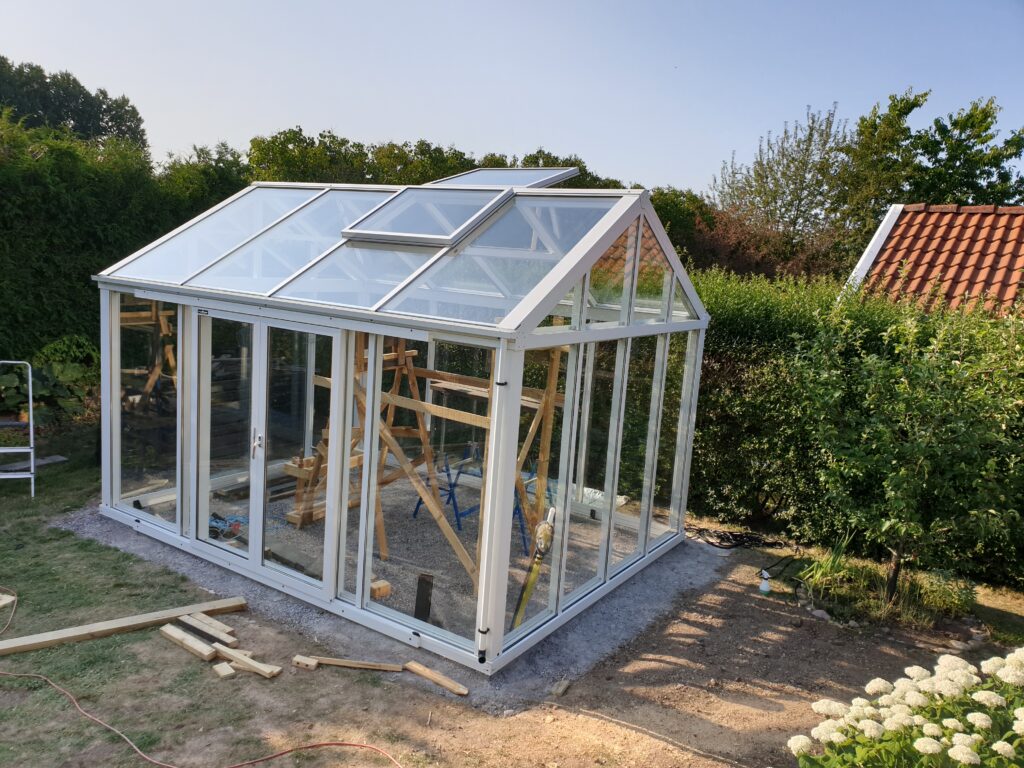
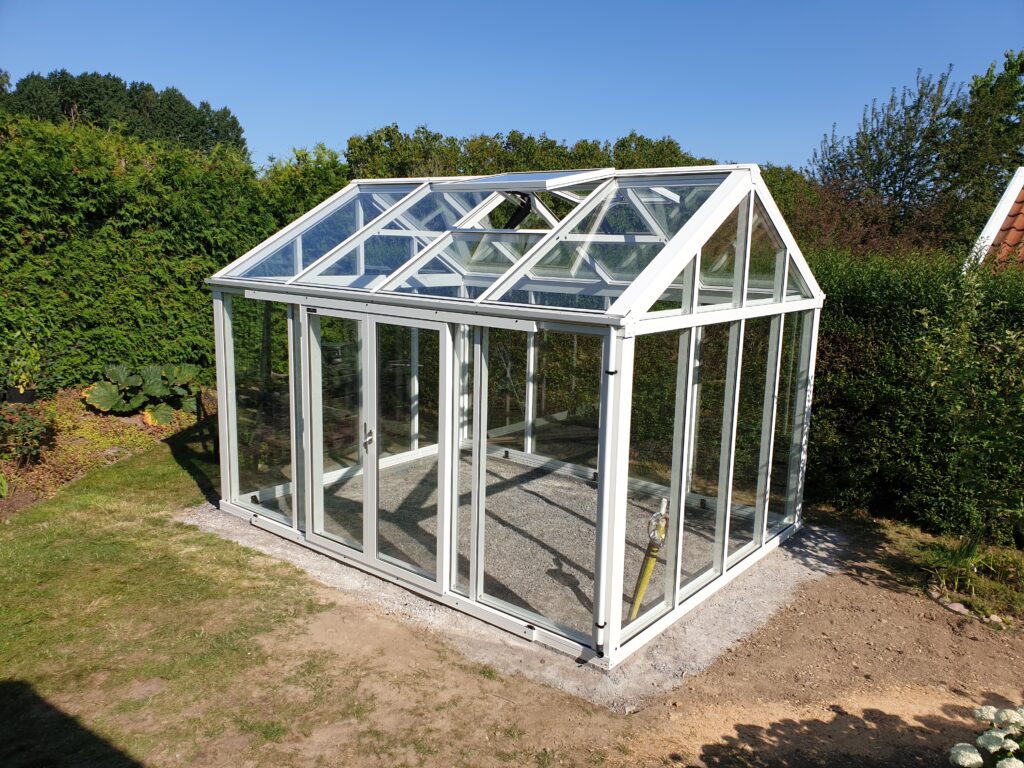
Att montera gummilisterna runt fönstren visade sig också vara besvärligt. Tricket att smörja med diskmedelsvatten fungerade inte alls på denna typ av list (de gled in för långt och hamnade i fel position), så mycket tålamod och ett hemgjort petverktyg av trä fick tas till. En del av rutorna behövde även lyftas lite för att få rätt avstånd mellan glas och aluminium. Finns det något bättre trick för att få listerna på plats?
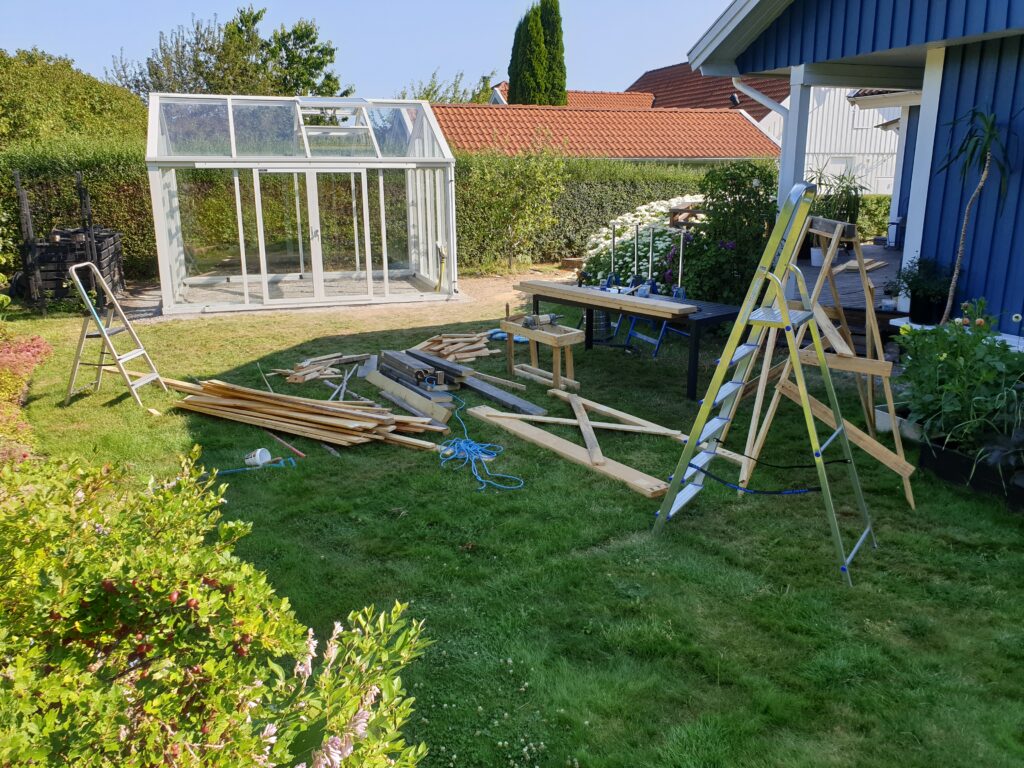
Nu återstår plattläggning samt el- och vatteninstallation.
Växthuset känns mycket gediget och de flesta delarna passade perfekt. Monteringsinstruktionerna var OK, med bara några mindre felaktigheter, men hade vunnit på att ha mycket mer beskrivande text med tips om vad man bör tänka på och hur man kan lösa olika moment. Det står att man ska vara två personer vid monteringen. Mycket av jobbet löste jag på egen hand, men vid vissa moment var det väldigt bra, för att inte säga nödvändigt, att vara tre. Åtminstone med de metoder som vi råkade använda.
